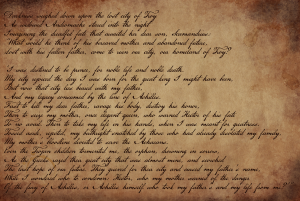23 Counter-narrative: Andromache and Scamandrius
By: Cy Hannahs, Miranda Mattlin, Angie Meneses, Juliana Romeo
Counter-narratives aim to tell the stories of individuals who are not given a voice in dominant culture. The Iliad prioritizes the stories of those who fought in the war, rather than those who lost their lives or loved ones in the war, or the effects of this trauma on the survivors years later. At the end of the poem, Hector is killed by Achilles with a spear, and Achilles allows animals to eat his dead body and drags the remains behind his chariot. Scamandrius, also nicknamed Astyanax, is Hector’s son, though the poem does not center his story because he is only a baby at the time of his father’s death. Andromache pictures the dreadful future that awaits her orphaned son, but Scamandrius never gets the chance to express his own grief due to his own death. Through his mother’s imagination, our counter-narrative evokes the perspective of a theoretical Scamandrius who survived the war and reflects on his childhood tragedy 18 years after his father’s death, his mother’s capture, and his city’s annihilation.

Text:
Darkness weighed down upon the lost city of Troy
As widowed Andromache stared into the night
Imagining the dreadful fate that awaited her dear son, Scamandrius:
“What would he think of his bereaved mother and abandoned future,
Lost with his fallen father, come to ruin our city, our homeland of Troy?
‘I was destined to be prince, for noble life and noble death.
My city rejoiced the day I was born for the great king I might have been,
But now that city lies buried with my father,
And my legacy consumed by the line of Achilles.
First to kill my dear father, ravage his body, destroy his honor,
Then to seize my mother, once elegant queen, who warned Hector of his fate
To no avail. Then to take my life in his hands, when I was meant for greatness.
Tossed aside, rejected, my birthright snatched by those who had already desolated my family,
My mother’s bloodline diverted to serve the Achaeans.
Even the Trojan children tormented me, the orphan, drowning in sorrow,
As the Greeks razed their great city that was almost mine and scorched
The last hope of our future. They grieved for their city and cursed my father’s name,
While I wondered who to condemn: Hector, who my mother warned of the danger
Of the fury of Achilles, or Achilles himself who took my father’s and my life from me?’”
